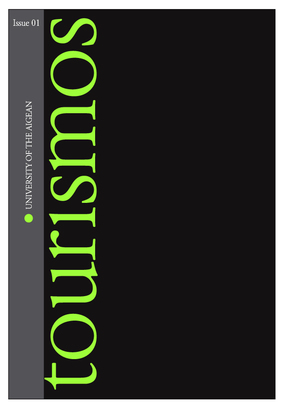The Pro Loco Italian volunteers involved in the promotion of tourist events
Part of : Tourismos : an international multidiciplinary journal of tourism ; Vol.8, No.2, 2013, pages 215-232
Issue:
Pages:
215-232
Section Title:
Research papers
Abstract:
The purpose of this study was describing who are the volunteers involved in thePro Loco association; analysing how the sense of identification is strong in theparticipants; identifying the functions of motivations and the sense of self-efficacyand collective efficacy in the participants. Participants were 222 Italianvolunteers. The 49% of them were members of the Pro Loco for more than 6years. They show a strong identification with the group. The main reasons fortheir involvement and commitment in Pro Loco are community function andunderstanding function; on the other hand the career function is not a linkedmotivation. Volunteers show good levels of self-efficacy and collective efficacyand a positive association between function, identification and sense of selfefficacyand collective efficacy. Regressions show that the motivation tocommunity function and understanding function are predictors of identificationand sense of self-efficacy and collective efficacy.
Subject:
Keywords:
Pro Loco, volunteers, functions, identification, self-efficacy, collective-efficacy
Notes:
Περιέχει σχήματα, πίνακες και βιβλιογραφία
References (1):
- Barbaranelli, C. & Capanna, C. (2001). Efficacia personale e collettiva delleassociazioni di volontariato socio-assistenziale. In G.V. Caprara (Eds.) Lavalutazione dell’autoefficacia. Costrutti e strumenti (pp. 147-156),Trento: Centro studi Erickson.Barbaranelli, C., Caprara, G.V., Capanna, C. & Imbimbo, A. (2003). Le ragionidel volontariato: un contributo empirico. Giornale Italiano di Psicologia,Vol. 30, No.2, pp.369-384.Callero, P.L., Howard, J.A. & Piliavin, J.A. (1987). Helping behavior as a rolebehavior: Disclosing social structure and history on the analysis ofprosocial action. Social Psychology Quarterly, No.50, pp.247-256.Chan, J.K.L. (2012). The key determinants of and barriers to internet adoption insmall and medium-sized hotels. Tourismos, Vol. 6, No.2, pp.55-73.Clary, E.G. & Snyder, M. (1991). A functional analysis of altruism and prosocialbehavior: The case of volunteerism. In M. Clark (Eds.) Prosocialbehavior. Review of personality and social psychology (pp. 119-148),Newbury Park, CA: Sage.Fermani, A. & Castellano, S. (2013). La promozione turistica del territorio: unostudio con i volontari delle pro loco marchigiane. Macerata: EUM. Inpress.Jepson, A., Wiltshire, P. & Clarke, A. (2008). Community Festivals: Involvementand Inclusion. Paper presented at the Council for Hospitality ManagementEducation: Int. Research Conf. Glasgow, United Kingdom: 14-16 May2004.Korres, G.M. (2008). The role of innovation activities in tourism and regionalgrowth in Europe. Tourismos. Vol. 3, No.1, pp.135-152.Kreiner, G.E. & Ashforth, B.E. (2004). Evidence toward an expanded model oforganizational identification. Journal of Organizational Behavior. No.25,pp.1–27.Yıldız, S., Üngüren, E. & Polat, C. (2009). The relationship between personality,gender and hotel departments: application of 16 personality factorquestionnaire in the Alanya region in Turkey. Tourismos. Vol. 4, No.1,pp.29-43.Marzana, D. (2011). Volontari si diventa: conoscere e promuovere l’impegno nelvolontariato e nella politica dei giovani italiani. Milano, Vita e Pensiero.Mathou, C. (2010). Volunteering in the European Union, 17 February 2010.http://ec.europa.eu/citizenship/pdf/doc1018_en.pdf. Accessed the 16 th ofMay 2013, at 8:00.Nardocci, C. (2007). Romantici Guerrieri. Roma: Le guide dell’Arcobaleno.Nassar, N.O. & Talaat, N.M. (2009). Motivations of Young volunteers in specialevents. Tourismos, Vol. 4, No.1, pp.145-152.Omoto, A.M. & Snyder, M. (1995). Sustained helping without obligation:Motivation, longevity of service, and perceived attitude change among AIDS volunteers. Journal of Personality and Social Psychology, Vol. 68,No.4, pp.671–686.Omoto, A.M., Snyder M. & Hackett, J. D. (2010). Personality and MotivationalAntecedents of Activism and Civic Engagement. Journal of Personality,Vol. 78, No.6, pp.1703-1734.Penner, L.A. & Finkelstein, M.A. (1998). Dispositional and StructuralDeterminants of Volunteerism. Journal of Personality and SocialPsychology, Vol. 74, No.2, pp. 25-537.Schroeder, D.A., Penner, L.A., Dovidio, J.F. & Piliavin, J.A. (1995). Thepsychology of helping and altruism. New York: McGraw-Hill.Snyder, M. & Omoto A.M. (2007). Social Action. In A.W. Kruglansky and E.T.Higgins (Eds.) Social Psychology: a handbook of basic principles (pp.940-961), New York: Guilford.Tomasello, F. (2009). Quanto cultura e territorio si coniugano nel fare turismo:l’esperienza dell’Unpli, Arcobaleno d’Italia. Vol. 6, No.22, pp.16-18.Zopiatis, A. & Constanti, P (2007). Mission impossible? Motivating hospitalitymanagers in Cyprus, Tourismos, Vol. 2, No.1, pp.31-46.




